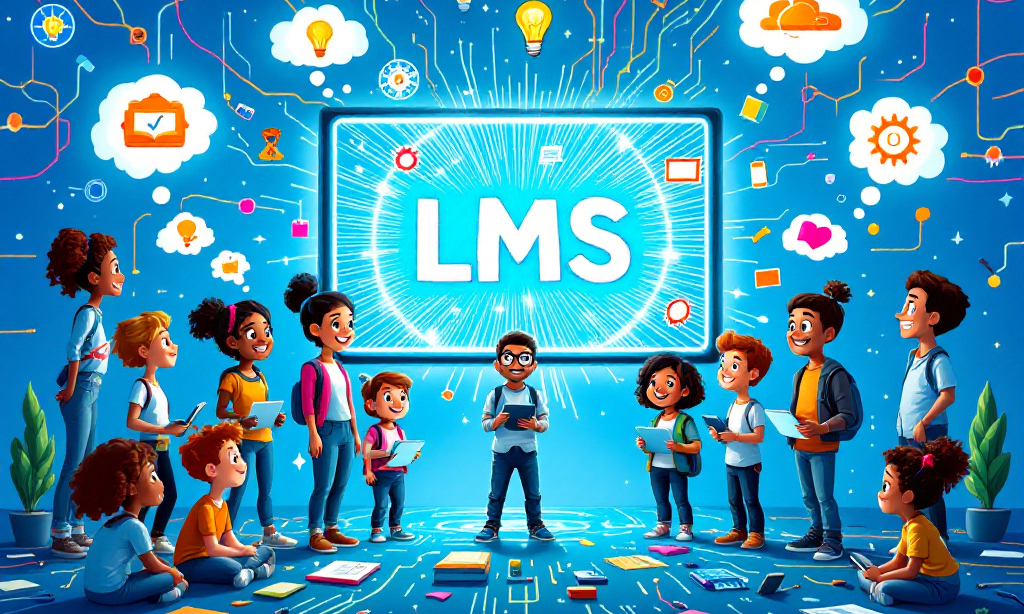
Introduction to Learning Management Systems (LMS)
Learning Management Systems (LMS) are software applications designed to facilitate the administration, documentation, tracking, reporting, and delivery of educational courses and training programs. In the realm of online coaching businesses, an LMS serves as a vital tool that streamlines the entire learning process, making it accessible and efficient for both coaches and learners.
The primary functionality of an LMS includes course creation, which allows educators to design and organize their content in a structured manner. This could range from text-based materials to multimedia resources, enhancing the learning experience by providing varied forms of engagement. For online coaching businesses, the ability to develop interactive courses can significantly enhance learner participation and satisfaction. Furthermore, an LMS provides the platform needed for course delivery. This is crucial for coaches who aim to reach students from diverse backgrounds and locations, as the LMS allows content to be delivered anytime and anywhere, creating an inclusive learning environment.
Additionally, assessment features within an LMS enable coaches to monitor student progress and performance. This data allows for tailored coaching methods and personalized feedback, facilitating a deeper understanding of learners’ needs. The LMS also supports various assessment forms, including quizzes, assignments, and certifications, thus preparing learners for practical applications of their knowledge. Overall, the role of an LMS in online coaching businesses cannot be overstated; it acts as a central hub for delivering educational content, assessing learner capabilities, and tracking overall course effectiveness.
Benefits of Using an LMS in Online Coaching

Utilizing a Learning Management System (LMS) in online coaching offers myriad advantages that can significantly enhance the overall coaching experience. One of the foremost benefits is increased organization. An LMS enables coaches to structure their content systematically, ensuring that learners can easily navigate through their courses without confusion. This organization not only streamlines the learning process but also gives coaches the ability to provide a more coherent learning path for their students.
Moreover, an LMS enhances learner engagement. Features such as interactive quizzes, multimedia content, and gamification elements motivate learners to participate actively in their education, fostering a more dynamic environment. By leveraging the tools available in an LMS, coaches can keep their learners interested and invested in the material, leading to better retention and understanding of concepts.
Scalability is another critical advantage of using an LMS. As online coaching businesses grow, the capacity to manage larger groups and diverse learning needs becomes essential. An LMS can handle an increasing number of participants seamlessly, allowing coaches to focus on content delivery rather than logistical concerns.
Data tracking and analytics capabilities within an LMS provide valuable insights into learner performance and progress. Coaches can view statistics regarding course completion rates, quiz results, and engagement levels. This data enables informed decisions about course adjustments and targeted support for students requiring additional help.
Cost-efficiency is yet another benefit, as implementing an LMS minimizes the need for extensive physical materials and provides a centralized platform to host courses. This aspect can lead to substantial savings in the long run. Additionally, improved communication features within an LMS facilitate timely interactions between coaches and learners, fostering a supportive online community.
In essence, integrating an LMS into online coaching not only streamlines administrative tasks but also enhances the overall learning experience, providing coaches with the tools needed to drive success in their programs.
Key Features to Look for in an LMS

When selecting a Learning Management System (LMS) for online coaching businesses, several key features should be prioritized to ensure it meets the unique demands of both coaches and learners. One of the foremost aspects to consider is ease of use. An intuitive interface allows coaches to create and manage content without extensive technical expertise, facilitating a smooth onboarding process for users who may not be technologically savvy. A simple navigation structure contributes to a better overall user experience, minimizing frustration and ensuring that learners can focus on acquiring new skills.
Another critical feature is mobile compatibility. In today’s fast-paced world, learners are often on the move, making mobile access essential. An LMS that offers a mobile-friendly interface ensures that participants can engage with content and complete assessments from any device, enhancing their flexibility and commitment to the coaching program.
Customization options are also imperative for creating a unique coaching environment that reflects the brand’s identity. The ability to tailor the look and feel of the LMS, from logos to course layouts, helps in delivering a personalized experience that can significantly enhance learner engagement.
In addition, robust assessment tools and reporting capabilities are crucial for tracking learner progress and providing feedback. Features such as quizzes, assignments, and comprehensive analytics allow coaches to measure the effectiveness of their training methods and identify areas where learners may need additional support. Finally, the ability to integrate with other educational tools and platforms can streamline operations and enhance the learning experience. This ensures that the LMS can seamlessly connect with video conferencing tools, content sharing platforms, or other resources essential for effective online coaching.
By focusing on these features, coaches can select an LMS that not only meets their needs but also enriches the learning experience for their clients.
Common Mistakes to Avoid When Choosing an LMS

Selecting a Learning Management System (LMS) can be a daunting task for coaching businesses, particularly given the myriad options available. One common mistake is failing to thoroughly assess specific needs before making a decision. Coaches often rush into the selection process without fully understanding the unique requirements of their program, which can lead to poor alignment between the LMS features and their educational goals. It is crucial to undertake a comprehensive needs assessment that considers the type of content to be delivered, the target audience, and the desired learning outcomes.
Another frequent misstep involves overlooking user experience when evaluating potential LMS platforms. A focus on advanced features can overshadow the importance of usability, which is vital for both coaches and learners. If the interface is not user-friendly, it may hinder engagement and retention. A platform that intuitively guides users through the learning process can significantly enhance overall satisfaction and effectiveness.
Furthermore, ignoring integration requirements is a critical oversight that can complicate operations down the line. Coaches should confirm that their chosen LMS is compatible with existing tools and technologies, such as customer relationship management (CRM) systems and communication platforms. Seamless integration can streamline processes and improve efficiency.
Lastly, underestimating the importance of long-term support is a prevalent mistake. When investing in an LMS, it is essential to consider the level of customer support that will be available. This includes evaluating the availability of technical assistance, training resources, and community engagement. Opting for a solution that provides robust support can mitigate issues and ensure that the system remains effective over time.
Case Studies of Successful LMS Implementation

Numerous online coaching businesses have successfully implemented Learning Management Systems (LMS) to enhance their training offerings, streamline operational efficiency, and improve learner engagement. Below, we explore a few case studies that illustrate the power of a well-chosen LMS.
In one case, a fitness coaching company faced significant challenges in managing client progress and delivering structured training programs. They selected an LMS that featured mobile access and interactive elements. During implementation, the company prioritized staff training to ensure all coaches were well-versed in using the system. As a result, they reported a 40% increase in client retention and higher satisfaction rates attributed to the system’s ability to track individual progress and deliver tailored content efficiently.
Another example involves a corporate coaching organization that struggled with scaling its training programs for remote employees. After choosing an LMS equipped with analytics and reporting capabilities, they were able to monitor learner performance effectively. The implementation process included integrating existing content from various sources into one cohesive platform. Within six months, the organization witnessed a significant drop in training completion time, and employee engagement scores improved by 35%, showcasing the LMS’s impact.
Additionally, an online language tutor service faced the challenge of attracting new students while maintaining quality instruction. By implementing an LMS tailored for language learning, the tutors incorporated gamification features and social learning opportunities. The addition of these elements made the courses more enticing. As a result, the business saw a 50% increase in new enrollments within the first quarter after launching the platform, driven by positive word-of-mouth and enhanced interactive learning experiences.
These case studies demonstrate that the right LMS can help online coaching businesses overcome specific challenges and achieve substantial outcomes. Selecting a learning management system that aligns with the unique needs and goals of the organization is crucial for success.
Cost Considerations When Choosing an LMS

When selecting a Learning Management System (LMS) for an online coaching business, understanding the financial implications is critical. The cost structure of LMS options can vary significantly, impacting the overall investment required. Initial setup costs typically encompass software purchases, customization, and integration with existing systems. These expenses can range from relatively modest to substantial, dependent on the features required and the complexity of the implementation process. As such, coaches should conduct thorough research on the pricing models of various LMS platforms to identify the most suitable options.
In addition to initial costs, ongoing maintenance expenses are a critical consideration. These may include costs related to updates, tech support, and potential upgrades as the coaching business grows. Subscription fees can also present an ongoing financial commitment, often based on a tiered structure that correlates with the features utilized or the number of users. Understanding the long-term cost implications of different LMS platforms is essential for managing budgets effectively.
Moreover, balancing budget constraints with required functionalities is vital when selecting an LMS. While some systems may appear more cost-effective, they could lack essential features that enhance the online learning experience and engagement levels. Therefore, online coaches must prioritize which functionalities and tools are necessary for their coaching business, ensuring that their selected LMS aligns well with their operational goals.
Ultimately, the financial commitment of implementing an LMS should be viewed in the context of potential return on investment (ROI). A well-chosen system can streamline administrative processes, enhance learner engagement, and improve overall coaching effectiveness. As a result, evaluating both the short-term and long-term financial aspects of an LMS is crucial for making a well-informed decision that supports the growth of an online coaching business.
Future Trends in Learning Management Systems

As the landscape of online coaching continues to evolve, Learning Management Systems (LMS) are becoming increasingly sophisticated, incorporating advanced technologies that offer significant benefits to both coaches and learners. One major trend is the integration of artificial intelligence (AI) within LMS platforms. AI can analyze user behavior and learning patterns to provide insights that drive customized learning experiences. This level of personalization not only enhances engagement but also improves knowledge retention, which is crucial for effective online coaching.
Another significant trend is the rise of personalized learning paths. Modern LMS solutions are now designed to allow coaches to create tailored curricula based on individual learner needs and preferences. This adaptability ensures that each learner receives content that aligns with their unique motivations and goals, fostering a more effective coaching environment. By using adaptive learning technologies, coaches can anticipate the needs of their clients, enhancing the coaching experience and outcomes.
Moreover, gamification is becoming a crucial element in online coaching platforms. By integrating game-like elements, such as point scoring, leaderboards, and badges, LMS can make learning more engaging and enjoyable. This strategy taps into the motivational aspects of game mechanics and helps sustain learners’ interest over extended periods. Gamification encourages active participation and fosters a community environment, which is essential for online coaching success.
Advancements in mobile learning are also reshaping the way coaching is delivered. With the increase in mobile device usage, LMS platforms must offer seamless access to learning materials on various devices. This adaptability allows learners to engage with content on-the-go, making it more convenient for them to fit coaching into their busy schedules.
Finally, data analytics is becoming an indispensable feature in LMS as coaches seek to refine their strategies and approaches. Analyzing user engagement, completion rates, and feedback can provide invaluable insights into the effectiveness of coaching programs. This data-driven approach enables coaches to make informed decisions on course content and delivery methods, ultimately enhancing the quality of coaching they provide.
The Role of Virtual Learning Communities in LMS

In the realm of online coaching, the efficacy of a Learning Management System (LMS) is significantly enhanced by the incorporation of virtual learning communities. These communities create a dynamic environment where learners can engage with one another, share experiences, and collaborate on various projects. Peer-to-peer interaction is a core element of the learning process, and when facilitated through an LMS, it promotes a richer educational experience. By providing platforms for discussions, forums, and group assignments, learners can benefit from diverse perspectives, enhancing their understanding of the subject matter.
Collaboration within virtual learning communities encourages learners to take an active role in their education. Members can exchange ideas, resources, and feedback, fostering a sense of belonging and camaraderie. This collaborative spirit not only improves knowledge retention but also instills important skills such as teamwork and problem-solving. Furthermore, the support derived from a learning community aids individuals in overcoming challenges they may face during the coaching process. When learners struggle, the community can provide encouragement, share solutions, or offer alternative approaches, thereby creating a supportive ecosystem.
The importance of community in the learning experience cannot be overstated. A robust virtual learning community facilitates communication between participants and instructors, allowing for a two-way dialogue that enriches the curriculum. Instructors can monitor discussions, address misunderstandings, and adjust content based on community feedback, ensuring that the learning experience remains relevant and impactful. Moreover, by integrating community features into the LMS, online coaching platforms can sustain learner engagement, driving motivation and commitment to the course. Ultimately, the synergy between a well-structured LMS and an active virtual learning community is crucial for the success of online coaching endeavors.
Conclusion and Next Steps

Choosing the right Learning Management System (LMS) for online coaching businesses is a crucial decision that can greatly impact the success of educational programs. Throughout this blog post, we have examined the various factors that influence this choice, highlighting the essential features that an effective LMS should possess, such as user-friendly interfaces, robust tracking capabilities, and scalability to meet growing demands. Each of these elements plays a vital role in ensuring that both coaches and learners have an optimal educational experience.
As online coaching continues to grow in popularity, it becomes increasingly important to select a platform that not only meets your current needs but also possesses the flexibility to evolve as your business expands. Researching different systems can provide valuable insights into the functionalities available, while hands-on experience with demonstrations can help ascertain how intuitive and effective a particular LMS might be for your specific coaching style. Consulting with experts in the field may also offer tailored advice, enabling you to make an informed decision that aligns with your unique requirements.
For a deeper understanding of the advantages of various Learning Management Systems, we encourage you to explore the helpful YouTube video linked below. This resource can enhance your comprehension and provide additional perspectives on available options.
We invite you to share your thoughts on this topic and discuss your experiences with different LMS solutions in the comments section. Engaging with our community will not only support others in their decision-making journey but also contribute to a richer understanding of how to best utilize technology in online coaching. Taking these next steps will empower you to make a strategic choice, ultimately enhancing the effectiveness of your coaching efforts.
